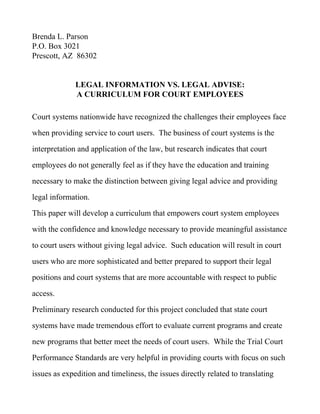
Legal Advise
- 1. Brenda L. Parson P.O. Box 3021 Prescott, AZ 86302 LEGAL INFORMATION VS. LEGAL ADVISE: A CURRICULUM FOR COURT EMPLOYEES Court systems nationwide have recognized the challenges their employees face when providing service to court users. The business of court systems is the interpretation and application of the law, but research indicates that court employees do not generally feel as if they have the education and training necessary to make the distinction between giving legal advice and providing legal information. This paper will develop a curriculum that empowers court system employees with the confidence and knowledge necessary to provide meaningful assistance to court users without giving legal advice. Such education will result in court users who are more sophisticated and better prepared to support their legal positions and court systems that are more accountable with respect to public access. Preliminary research conducted for this project concluded that state court systems have made tremendous effort to evaluate current programs and create new programs that better meet the needs of court users. While the Trial Court Performance Standards are very helpful in providing courts with focus on such issues as expedition and timeliness, the issues directly related to translating
- 2. court functions and procedures for the lay court user are often overlooked. Surveys also conclude that the general public is confused about court systems and the procedures required in order for them to actively participate in their own litigation. Self-represented litigants have increased dramatically over the past few years, placing a burden on court system employees to provide more information in order to facilitate the ease with which a court user can access a court system. Under Arizona’s court structure (elected judges, elected clerks of court), a disconnect exists between the legal imposition of justice by the judiciary and the practical application of justice by the clerks of court and court administrators. Statistical information indicates that the judiciary has been unable to reach consensus with respect to how much assistance to provide court users. That same statistical information also indicates that court system employees who work directly with the public support the concept that court users need information in order to meet their burdens before the judiciary. The research methodology used for this project included an electronic survey of Arizona’s court system employees. The survey asked employees if they provide legal information and then asked them if they were provided with a definition of legal information. It also asked them if they believed they had been adequately trained to know the difference between providing legal information and giving legal advice. As this curriculum was developed, it was tested with small, focused groups of participants and was well received. It was
- 3. intended to encourage participants to think differently about their roles and about the importance of meaningful assistance. The comments returned by participants indicate that this curriculum accomplishes that goal. This curriculum provides participants with information that is easily referenced and readily shared with co-workers. Its effectiveness is evaluated through assessments that are performed throughout. These assessments also provide a basis for discussion and clarification. Besides being a guide to court system employees as they work with court users, this curriculum is designed to be portable and practical. In other words, court supervisors will be able to facilitate the curriculum themselves in their own courts without requiring a legal professional to come to them and without requiring their employees to travel to a more central location. It will, however, require the support of the presiding judge and/or elected clerk of court in order to be implemented successfully. It can also be modified to pay particular attention to local needs and customs. The conclusions reached in this project mirror what pro se programs across the United States have concluded: the importance of providing meaningful assistance to court users. It is the beginning step to ensuring equal access to swift and fair justice. This research paper is available in its entirety in portable document format. To access, you must first obtain and install the Adobe Acrobat Reader
- 4. To obtain a copy of this research paper, please contact: Knowledge Information Services National Center for State Courts 300 Newport Avenue Williamsburg, VA 23185 Phone: (800) 616-6164